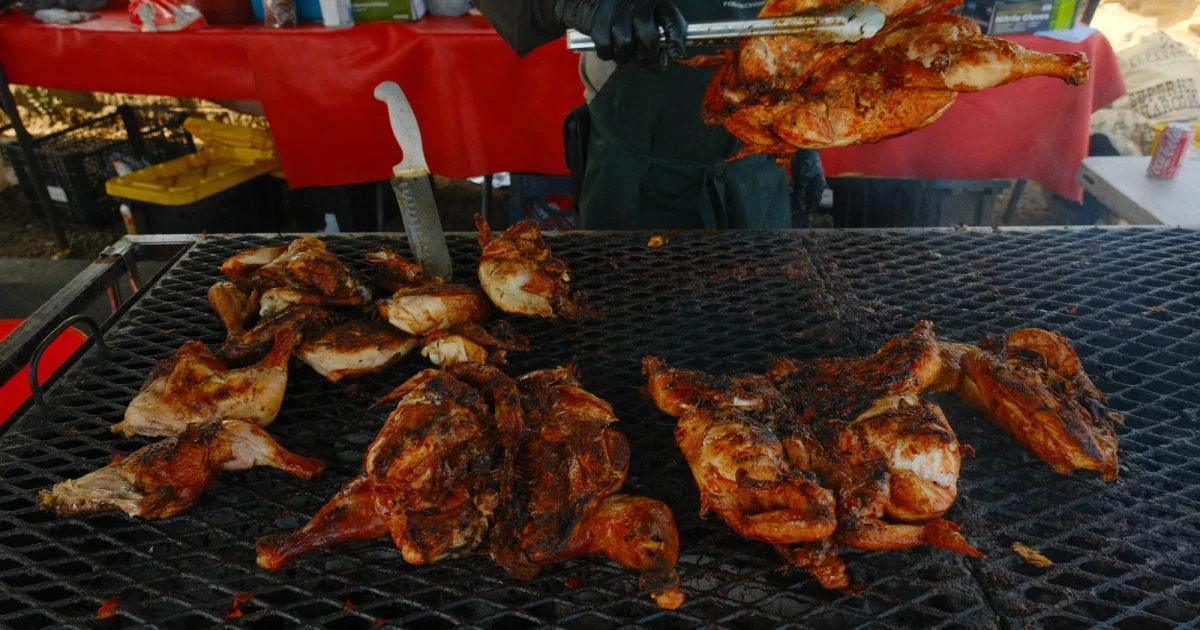Keep up with LAist.
If you’re enjoying this article, you’ll love our daily newsletter, The LA Report. Each weekday, catch up on the 5 most pressing stories to start your morning in 3 minutes or less.
This story was originally published by Boyle Heights Beat on August 18, 2025.
Sitting in the shade of a building in Boyle Heights, Maria scanned the corner for potential customers.
Her stock of fresh produce and snacks sat neatly displayed on a nearby table while a chihuahua quietly napped at her feet.
Maria is undocumented. For nearly two decades, she has worked as a street vendor. Despite her fears of being arrested by immigration enforcement, she said she has no choice but to keep working.
“If I don’t make a living, I don’t have money to eat,” Maria said, adding that she doesn’t receive much government assistance. “The only help they give me is the doctor, nothing else… I have to find my own way to buy my little things to eat.”
While the frequency of ICE raids has slowed in recent weeks — following a federal judge’s temporary restraining order — the threat hasn’t disappeared. Along major Eastside corridors, businesses hard-hit by the lull in customers have slowly begun to see more foot traffic. But for many undocumented street vendors like Maria, taking a break from earning income was never an option.
One undocumented taquero in East L.A., who asked not to be named, said he’s seen a 50% drop in business since the raids began. He took a week off in June and only returned because he needed to pay “rent, bills, car insurance, everything,” he said.
Even vendors with lawful status have felt the fear. Mayra Diaz, who sells beauty products in Boyle Heights, doesn’t trust that her papers will protect her. She said she’s seen immigration enforcement agents racially profile people on the news and social media.
“With papers or without papers, [immigration enforcement] can pick you up and take you. But I have to work,” she said on a recent afternoon. “We haven’t gotten enough for the rent or even to eat. I haven’t even made a dollar today. Ever since this started there is nothing because people are fearful. They fear going shopping. But we have to be here to work.”
Street vending is more than survival — it’s a significant part of the city’s economic output.
According to the Economic Roundtable, a local nonprofit research organization, the street vending industry generates more than $500 million for the local economy. A 2015 study by the group shows that street vendors not only boost the local economy but may also contribute to lower crime rates in the neighborhoods where they operate.

A street vendor walks along Cesar E. Chavez Avenue in Boyle Heights.
(
Andrew Lopez
/
Boyle Heights Beat
)
Street vendor advocates step up
Luis Moran, of Inclusive Action for the City, a Boyle Heights-based economic justice nonprofit, said he’s heard of vendors taking four to five weeks off, only to return to street corners or sidewalks where their usual clientele is gone.
“It’s not just the financial hardship… some people have expressed that they’ve lost their dignity, in a sense. It’s like, ‘I don’t know how to provide for my family because I can’t work. This is all I know how to do,’” Moran said.
In response, the group has supported several initiatives to help vendors recover income, including the Hire a Vendor program, which connects businesses with vendors for catering events. To date, nearly $80,000 has been directly paid to street vendors through more than 160 opportunities this year, he said. The organization has also raised nearly $200,000 to support street vendors who’ve lost income since the raids began.
One vendor family who has benefited from Inclusive Action’s programs is Edwin and his father. Edwin has legal status, but his father does not. The father-son duo has sold nieve de garrafa, a style of hand-churned ice cream, across the Eastside for years, but when the ICE raids began, Edwin’s father had to step back from the business out of fear of immigration enforcement.
“This program has been really helpful, because it’s a guarantee of not only money and service, but it’s also a guarantee of safety of being able to go out and do your job,” Edwin said, adding that since the raids began, his family’s business has seen more than a 50% drop in business.

Foot traffic has slowly returned to Cesar E. Chavez Avenue.
(
Andrew Lopez
/
Boyle Heights Beat
)
A vendor network united
Gutierrez, a longtime fruit vendor on the Eastside, said he had no choice but to keep working despite the fear.
But he’s seen one positive emerge from the anxiety that grips local vendors like him: a sense of unity and solidarity among street vendors.
“Other vendors, especially the ones around me, always look out for each other,” Gutierrez said, adding that many of his neighbors in the community are just a call away. Another vendor around the corner had the same sentiment.
“All the vendors here communicate with each other on whatever comes up,” she said.
While that community support has helped them keep watch, it’s unclear how long they can keep going under the weight of uncertainty.
Jesus, a street food vendor in East L.A., said he stopped selling for about a week out of fear of immigration enforcement but returned at his usual location out of necessity. He saw that a federal judge paused the raids last month, but he’s not convinced it’s over — especially as enforcement has resumed in places like Home Depot parking lots.
“Making a living on the street is not easy but everyone has to make a living off something,” Jesus said.
